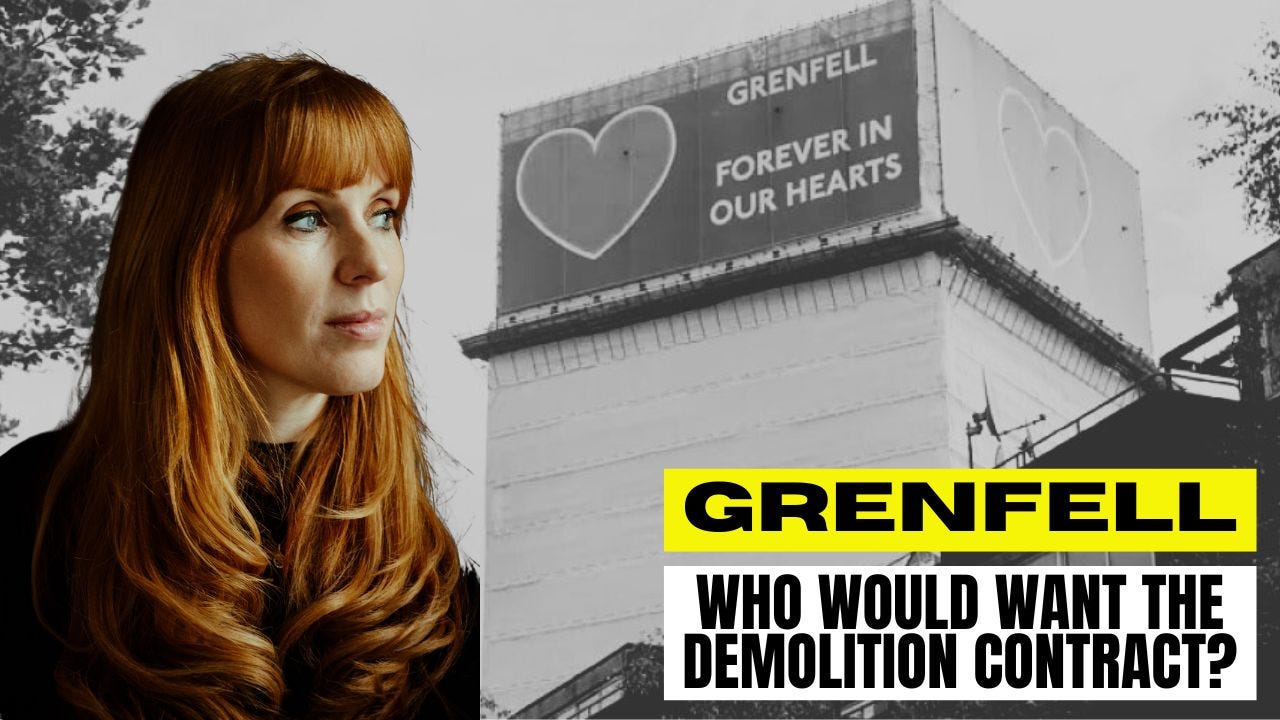Grenfell - Who would want the demolition contract?
At some point in the next month or so, the deputy prime minister will make an announcement about the future of Grenfell Tower.
Some believe it should remain as a permanent reminder of the greed and dishonesty that led to the tragedy in the first place. Others argue that the remains of the building should be demolished; to bring some closure to the families of those killed.
But that begs the question: Who would want the job of demolishing Grenfell Tower?
It’s a question that resonates deeply, considering the profound tragedy that unfolded on 14 June 2017, when 72 lives were lost in a catastrophic fire. The tower, now a haunting symbol of systemic failures and profound loss, stands as a stark reminder of the need for accountability and change. As Deputy Prime Minister Angela Rayner prepares to decide the tower's fate next month, the prospect of its demolition raises complex emotional, ethical, and technical challenges.
The Grenfell Tower fire was not merely an accident but a culmination of systemic negligence, regulatory failures, and corporate malpractice. The public inquiry's final report, published in September 2024, delivered a damning verdict on the construction industry's practices, highlighting a "chain of failures" and "systematic dishonesty" that led to the disaster.
This context amplifies the sensitivity surrounding any decision to demolish the tower, as it embodies the need for justice and remembrance for the victims and their families.
The bereaved families and the local community are deeply divided over the tower's future. Some advocate for its demolition, seeking closure and the establishment of a fitting memorial to honour the victims. Others argue for its preservation, at least in part, as a lasting testament to the systemic failures that led to the tragedy. This division underscores the profound emotional weight any demolition would carry, making the role of the demolition contractor not just a technical endeavour but a deeply human one.
From a technical perspective, demolishing Grenfell Tower presents its own issues. Experts have warned that such an operation would be "challenging" and require extremely careful planning and execution.
The tower's current state, coupled with its location in a densely populated urban area, adds layers of complexity to the demolition process. Ensuring the safety of workers and residents, managing environmental concerns, and meticulously planning the dismantling process are critical components that any contractor would need to navigate with utmost precision.
The scrutiny accompanying this demolition would be unparalleled. Media outlets, both national and international, would closely monitor every step, while the local community would watch with a vigilant eye, ensuring that the process honours the memory of the victims and respects the sentiments of the bereaved. Any misstep could cause deep emotional harm, further eroding public trust.
The emotional burden on demolition workers tasked with dismantling Grenfell Tower would be immense. They wouldn’t be merely engaging with a structure; they would be entering a sacred space marked by profound loss and grief. Each brick and beam they handled would be a poignant reminder of the lives lost and the harrowing stories of survival and bereavement. The weight of this tragedy would be ever-present, and workers would be constantly aware of the emotional and symbolic significance of their actions. The psychological impact of working at such a site could be profound, requiring not only physical skill but also emotional resilience and deep empathy for the bereaved community.
Moreover, the ethical implications for any contractor involved are profound. The construction industry has faced intense criticism for its role in the events leading up to the Grenfell tragedy. Engaging in the demolition could be seen as an opportunity for the industry to demonstrate accountability and a commitment to rectifying past wrongs. However, it also risks being perceived as profiting from a disaster, a notion that could further damage the industry's reputation if not handled with transparency and sensitivity.
The decision to demolish Grenfell Tower is not merely a matter of structural engineering; it is a deeply symbolic act that intersects with issues of justice, memory, and community healing. The contractor who undertakes this task - assuming it goes ahead - would need to possess not only technical expertise but also a profound understanding of the human dimensions involved. They would need to engage with the community, listen to the bereaved families, and approach the task with humility and respect.
But who would want the job of demolishing Grenfell Tower?
This topic was the subject of an in-depth discussion on today's after show chat. You can listen to the resulting podcast here.





